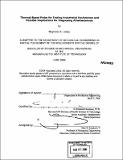Thermal-based probe for testing endothelial dysfunction and possible implications for diagnosing atherosclerosis
Author(s)
Lediju, Muyinatu A. (Muyinatu Adebisi)
DownloadFull printable version (3.382Mb)
Other Contributors
Massachusetts Institute of Technology. Dept. of Mechanical Engineering.
Advisor
H. Frederick Bowman.
Terms of use
Metadata
Show full item recordAbstract
Endothelial dysfunction is a precursor to atherosclerosis. Thus, the vascular health of an individual can be assessed if endothelial dysfunction can be readily and unambiguously quantified. A thermal-based approach using temperature and blood perfusion measurements in conjunction with an arterial challenge has the potential to quantitatively assess endothelial dysfunction. This report includes a detailed review of previous attempts to characterize endothelial dysfunction and a preliminary evaluation of a thermal-based approach that relies on temperature and perfusion measurements. Two simple thermal models are used to contextualize results obtained from this technique. Results reveal that this thermal-based method serves as a valid indicator of endothelial assessment while at the same time reducing some of the mitigating factors of existing approaches to identifying endothelial dysfunction. More testing must be performed in order to optimize this thermal-based approach.
Description
Thesis (S.B.)--Massachusetts Institute of Technology, Dept. of Mechanical Engineering, 2006. Includes bibliographical references (leaves 51-54).
Date issued
2006Department
Massachusetts Institute of Technology. Department of Mechanical EngineeringPublisher
Massachusetts Institute of Technology
Keywords
Mechanical Engineering.